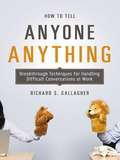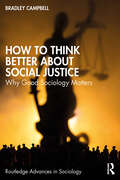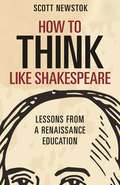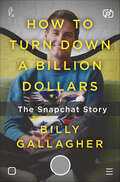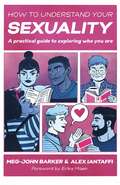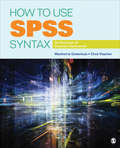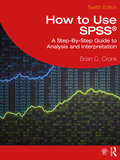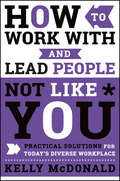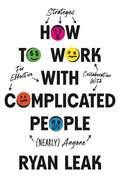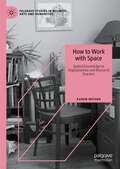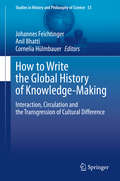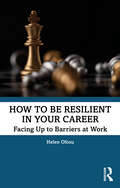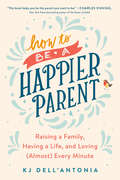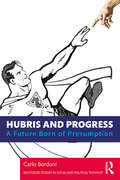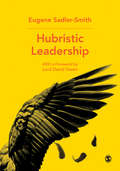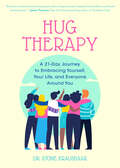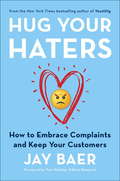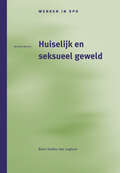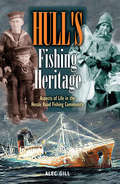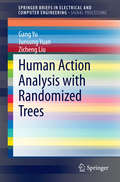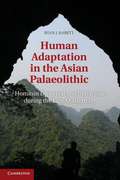- Table View
- List View
How to Tell Anyone Anything: Breakthrough Techniques for Handling Difficult Conversations at Work
by Richard GallagherNo one likes to be criticized, but this book teaches the communication skills needed to successfully get the message across while keeping feelings and relationships intact.Drawing from the latest in psychology on how best to connect with others, How to Tell Anyone Anything steers you away from the common mistake of providing feedback by focusing on what&’s wrong and shows you instead how to provide clear, constructive positive messages that create real behavior and performance change.You&’ll learn how to:be more candid,prioritize relationships,ask important questions,reframe difficult messages,control your emotions,and be graceful when you&’re on the receiving end of difficult feedback.Complete with illuminating examples and a unique step-by-step process, How to Tell Anyone Anything gives you powerful insight into how we all react naturally to criticism--and how to transform interactions that might become verbal tugs-of-war into collaborative problem-solving sessions.
How to Think Better About Social Justice: Why Good Sociology Matters (Routledge Advances in Sociology)
by Bradley CampbellThose who are pursuing social justice too often fail to incorporate the insights of sociology, and when they do make use of sociology, they often draw heavily from claims that are highly contested, unsupported by the evidence, or outright false. This book shows why learning to think sociologically can help us to think better about social justice, pointing us toward possibilities for social change while also calling attention to our limits; providing us with hope, but also making us cautious. Offering a series of tips for thinking better about social justice, with each chapter giving examples of bad sociological thinking and making the case for drawing from a broader range of sociological theory and research to inform social justice efforts, it advocates an approach rooted in intellectual and moral humility, grounded in the normative principles of classical liberalism. A fresh approach to social justice that argues for the importance of sociological understanding of the world in our efforts to change it, How to Think Better About Social Justice will appeal to scholars and students of sociology with interests in social justice issues and the sociology of morality, as well as those working to bring about social change.
How to Think like Shakespeare: Lessons from a Renaissance Education (Skills For Scholars Ser.)
by Scott NewstokA lively and engaging guide to vital habits of mind that can help you think more deeply, write more effectively, and learn more joyfullyHow to Think like Shakespeare offers an enlightening and entertaining guide to the craft of thought—one that demonstrates what we've lost in education today, and how we might begin to recover it. In fourteen brief, lively chapters that draw from Shakespeare's world and works, and from other writers past and present, Scott Newstok distills vital habits of mind that can help you think more deeply, write more effectively, and learn more joyfully, in school or beyond.Challenging a host of today's questionable notions about education, Newstok shows how mental play emerges through work, creativity through imitation, autonomy through tradition, innovation through constraint, and freedom through discipline. It was these practices, and a conversation with the past—not a fruitless obsession with assessment—that nurtured a mind like Shakespeare's. And while few of us can hope to approach the genius of the Bard, we can all learn from the exercises that shaped him.Written in a friendly, conversational tone and brimming with insights, How to Think like Shakespeare enacts the thrill of thinking on every page, reviving timeless—and timely—ways to stretch your mind and hone your words.
How to Turn Down a Billion Dollars: The Snapchat Story
by Billy Gallagher"In the grand tradition of Ben Mezrich's The Accidental Billionaires (2009)... an engaging look into a fascinating subculture of millions." —Booklist"Breezy...How to Turn Down a Billion Dollars ably if uncritically chronicles the short history of a young company catering to young users, with a young chief executive, and reveals, intentionally or not, the limitations that come with that combination." —Wall Street JournalThe improbable and exhilarating story of the rise of Snapchat from a frat boy fantasy to a multi-billion dollar internet unicorn that has dramatically changed the way we communicate.In 2013 Evan Spiegel, the brash CEO of the social network Snapchat, and his co-founder Bobby Murphy stunned the press when they walked away from a three-billion-dollar offer from Facebook: how could an app teenagers use to text dirty photos dream of a higher valuation? Was this hubris, or genius? In How to Turn Down a Billion Dollars, tech journalist Billy Gallagher takes us inside the rise of one of Silicon Valley's hottest start-ups. Snapchat developed from a simple wish for disappearing pictures as Stanford junior Reggie Brown nursed regrets about photos he had sent. After an epic feud between best friends, Brown lost his stake in the company, while Spiegel has gone on to make a name for himself as a visionary—if ruthless—CEO worth billions, linked to celebrities like Taylor Swift and his wife, Miranda Kerr. A fellow Stanford undergrad and fraternity brother of the company’s founding trio, Gallagher has covered Snapchat from the start. He brings unique access to a company Bloomberg Business called “a cipher in the Silicon Valley technology community.” Gallagher offers insight into challenges Snapchat faces as it transitions from a playful app to one of the tech industry’s preeminent public companies. In the tradition of great business narratives, How to Turn Down a Billion Dollars offers the definitive account of a company whose goal is no less than to remake the future of entertainment.
How to Understand Your Sexuality: A Practical Guide for Exploring Who You Are
by Alex Iantaffi Meg-John BarkerGay, straight, queer, pansexual, demisexual, ace...? Sexuality is complex and diverse, but it doesn't have to be confusing.This down-to-earth guide is the ultimate companion for understanding, accepting and celebrating your sexuality. Written by two internationally renowned authors and therapists, the book explains how sexuality works in terms of our identities, attractions, desires and practices, and explores how it intersects with our personal experiences and the world around us.With activities and reflection points throughout, it offers space to tune into yourself and think deeply about your own sexuality. You'll hear from people across the sexuality spectrum and in different relationship set-ups, and be inspired by the ideas of scholars, activists and practitioners. Sexuality is a vast and wonderful landscape - let this book guide you on your journey!
How to Use SPSS Syntax: An Overview of Common Commands
by Chris Visscher Manfred te GrotenhuisRather than focusing on SPSS menus and the graphic user interface, How to Use SPSS Syntax focuses on the syntax rules in SPSS, a more encompassing approach that allows readers to replicate statistical analyses by storing them in a file for future use. Practical, accessible, and highly focused, the book is brief, while still helping readers develop an in-depth understanding of the common syntax rules and commands. In every chapter, the authors clearly explain the syntax, show the main results, and include social science research examples and downloadable files that allow readers to follow along. Checks throughout the book help readers determine whether the syntax is used correctly.
How to Use SPSS Syntax: An Overview of Common Commands
by Chris Visscher Manfred te GrotenhuisRather than focusing on SPSS menus and the graphic user interface, How to Use SPSS Syntax focuses on the syntax rules in SPSS, a more encompassing approach that allows readers to replicate statistical analyses by storing them in a file for future use. Practical, accessible, and highly focused, the book is brief, while still helping readers develop an in-depth understanding of the common syntax rules and commands. In every chapter, the authors clearly explain the syntax, show the main results, and include social science research examples and downloadable files that allow readers to follow along. Checks throughout the book help readers determine whether the syntax is used correctly.
How to Use SPSS®: A Step-By-Step Guide to Analysis and Interpretation
by Brian C. CronkHow to Use SPSS® is designed with the novice computer user in mind and for people who have no previous experience using SPSS. Each chapter is divided into short sections that describe the statistic being used, important underlying assumptions, and how to interpret the results and express them in a research report. The book begins with the basics, such as starting SPSS, defining variables, and entering and saving data. It covers all major statistical techniques typically taught in beginning statistics classes, such a descriptive statistics, graphing data, prediction and association, parametric inferential statistics, nonparametric inferential statistics and statistics for test construction. More than 275 screenshots (including sample output) throughout the book show students exactly what to expect as they follow along using SPSS. The book includes a glossary of statistical terms and practice exercises. A complete set of online resources including video tutorials and output files for students, and PowerPoint slides and test bank questions for instructors, make How to Use SPSS® the definitive, field-tested resource for learning SPSS. New to this edition: Fully updated to the reflect SPSS version 29. Every screen shot has been recaptured. New video supplements for all practice exercises. References to significance levels have been updated to reflect the new SPSS output format. Effect size is now shown in output for many procedures and reference to some effect size has been moved from Appendix A to be more integrated into the chapters. Sample results sections now also include effect size where SPSS directly calculates effect size. A new section covering the EXPLORE command has been added to Chapter 3.
How to Work With and Lead People Not Like You: Practical Solutions for Today's Diverse Workplace
by Kelly McdonaldIf you're in a diverse team, you know employee differences can cause miscommunication, lower trust, and hurt productivity. . . It doesn't have to be this way! The people you work with may be from a different generation, different culture, different race, different gender, or just a different philosophy toward work and life in general, but you need to work together toward a common goal. How to Work With and Lead People Not Like You explains how to dial down the differences, smooth out the friction, and play upon each other's strengths to become more effective, more productive, and less stressed. The keys are to find the common ground and identify hidden conflicts that are hurting productivity. Many people shudder at the prospect of working with diverse groups of people, but they can't voice their fear or anxiety. At work, it's not OK or politically correct to say, 'I'm uncomfortable with this person.' In fact, if you do say something along those lines, your job may be at risk. Your company may terminate you for not being on the 'diversity bandwagon.' So you keep quiet and you keep your thoughts to yourself. But deep down, you are uncomfortable. If you feel like this, it doesn't mean you're racist, sexist, ageist, homophobic, or any other negative label. It means you're struggling. You're struggling to understand people, cultures, or values that are unfamiliar to you. You're struggling to do your job with teammates and coworkers who may have very different viewpoints or different approaches to communication than you have. You're struggling to overcome differences and pull together to achieve high performance at work. Whether you're leading a diverse team, working in a challenging cross-cultural environment, or simply working with people who are 'not like you,' you need to be able to get along with everyone as a team, to get the work done. This book explains the skills you need to communicate, motivate, and inspire people to collaborate—even if they have very different values, lifestyles, or priorities. Learn key steps that bring cohesion to diversity How to have a constructive conversation about working alongside people who are different The four magic words that make this easier and smooth over friction What not to say—and why Learn to set aside differences and get things done Learn how to handle a racist, sexist, homophobic or offensive remark in a professional way Retain your sanity when colleagues drive you crazy The changing demographics of today's workforce bring conflicting viewpoints, perspectives, approaches, skills, habits, and personalities together in one place; whether that leads to synergy or catastrophe is up to you. How to Work With and Lead People Not Like You helps you turn a hurdle into an advantage so you or your team can do more, achieve more, and enjoy the ride.
How to Work with Complicated People: Strategies for Effective Collaboration with (Nearly) Anyone
by Ryan LeakBestselling author and transformational speaker Ryan Leak shares research-based strategies for working with even the most challenging people to create more collaborative and productive teams.Who is the most complicated person you work with? You probably don&’t have to think very hard to answer that question. You already know their name, their job title, their quirks, and their flaws. You have firsthand experience with the mental and emotional fallout they leave in their wake. You&’ve seen the problems their complexity creates for everyone on their team. You wish you could fix them, solve them, ignore them, or teleport them to a parallel dimension. But you can&’t. You have to work with them. (You could quit, but your next job will have a complicated person waiting for you.) That means you need effective strategies to collaborate with (nearly) anyone. Especially the picky, prickly, problematic ones. Drawing from his global consulting experience with teams and leaders from the glitz of sports and entertainment, to the number-crunching world of finance, to the meticulous realms of insurance, pharma, and manufacturing, Ryan Leak provides proven strategies for… Seeing challenging individuals as human beings to understand rather than problems to solve Detoxing unrealistic expectations and getting comfortable with complicated Learning to communicate effectively in complex environments Embracing healthy disagreement as a tool to discover better solutions Setting boundaries that let people into your world without letting them run your world &“The process of learning to collaborate with difficult individuals is transformative—it&’s a gateway to greater creativity, stronger teams, and increased productivity,&” Leak explains. &“On the other side of complicated is the wonderful, wide-open world of effective collaboration and a workplace you love.&”
How to Work with People... and Enjoy It!
by Sarah Gornall Jenny BirdHow to Work with People… and Enjoy It! is an invaluable, accessible, practical handbook for anyone who works with people. It includes pointers for reflection, tools for experimentation, models for analysing relational dynamics, and tables and diagrams to stimulate discovery and development. Leadership and relationship start with us as individuals - the stories we tell ourselves, about the world and our place in it - and this book takes us on a journey from the inside out. Jenny Bird and Sarah Gornall challenge us to explore our own part in all our interactions - smooth and rough - and offer us ways to change our story, our interactions and our outcomes. New and original models suggest ways to minimise interference and maximise potential, improve results - and enjoy both work and all our interactions with others more. How to Work with People… and Enjoy It! is written by two highly experienced international coaches, and their wisdom and humour shine through on every page. Illustrated and informative, it is a key handbook for leaders and managers, HR and Learning and Development professionals, mentors and coaches. Highly accessible, with numerous case studies and experiments, it is also an invaluable resource for anyone who is not totally satisfied with the way they work, communicate and interact with others.
How to Work with Space: Spatial Knowledge in Organizations and Research Practice (Palgrave Studies in Business, Arts and Humanities)
by Karen MesserThis book is an exploration of the entangled spatial relationships with and within organizations and research practice. Situating our environment as an active participant in the outcomes of day-to-day living heightens the role space can have as a co-creator of experience, behaviour and emotion. Physical environments tend to fade into the background, becoming an unseen, untended, accompaniment in our journey. However, through active attunement and deep noticing, spatial details arise through our bodies, senses, conversations and physical encounters. As the nature of work continues to evolve, understanding and shifting our relationship with the work environment broadens the scope of how space and work are engaged and performed. This thoughtful book will be of great interest to academics and students of organisational studies, as well as those involved in interdisciplinary research across geography, anthropology and the social sciences.
How to Write the Global History of Knowledge-Making: Interaction, Circulation and the Transgression of Cultural Difference (Studies in History and Philosophy of Science #53)
by Johannes Feichtinger Anil Bhatti Cornelia HülmbauerThis multidisciplinary collection of essays provides a critical and comprehensive understanding of how knowledge has been made, moved and used, by whom and for what purpose. To explain how new knowledge emerges, this volume offers a two-fold conceptual move: challenging both the premise of insurmountable differences between confined, autarkic cultures and the linear, nation-centered approach to the spread of immutable stocks of knowledge. Rather, the conceptual focus of the book is on the circulation, amalgamation and reconfiguration of locally shaped bodies of knowledge on a broader, global scale. The authors emphasize that the histories of interaction have been made less transparent through the study of cultural representations thus distorting the view of how knowledge is actually produced.Leading scholars from a range of fields, including history, philosophy, social anthropology and comparative culture research, have contributed chapters which cover the period from the early modern age to the present day and investigate settings in Africa, Asia, and Europe. Their particular focus is on areas that have largely been neglected until now. In this work, readers from many disciplines will find new approaches to writing the global history of knowledge-making, especially historians, scholars of the history and philosophy of science, and those in culture studies.
How to be Resilient in Your Career: Facing Up to Barriers at Work
by Helen OfosuThis book shares vital career advice to help professionals navigate common "internally disruptive" career experiences such as harassment and bullying, imposter syndrome, membership in an underrepresented group, toxic workplaces, discrimination, and more. Dr. Helen Ofosu draws on twenty years of helping employers acquire talent and coaching professionals through difficult career choices to unpack these layered and complicated issues in an easy-to-follow way. Dealing with the dark side of management, the book outlines various issues that can occur in the workplace, or during a person’s career journey, and offers practical advice on how to overcome these obstacles and setbacks. Using her considerable HR experience, Dr. Ofosu also offers coveted insights from the employer’s point of view. For people who have already tried other options to resolve their complicated career issues, this book offers an essential guide that equips readers with a knowledge base to make informed decisions around building and sustaining a thriving and resilient career. How to be Resilient in Your Career: Facing Up to Barriers at Work is a reliable resource presented with nuance, depth, and specificity. Psychologists, psychotherapists, social workers, and HR professionals who are looking for effective advice when supporting people struggling with these issues, will greatly benefit from this book, as will early career professionals, and established earners looking to resolve their career issues.
How to be a Happier Parent: Raising a Family, Having a Life, and Loving (Almost) Every Minute
by Kj Dell'AntoniaAn encouraging guide to helping parents find more happiness in their day-to-day family life, from the former lead editor of the New York Times Motherlode blog.In all the writing and reporting KJ Dell'Antonia has done on families over the years, one topic keeps coming up again and again: parents crave a greater sense of happiness in their daily lives. In this optimistic, solution-packed book, KJ asks: How can we change our family life so that it is full of the joy we'd always hoped for? Drawing from the latest research and interviews with families, KJ discovers that it's possible to do more by doing less, and make our family life a refuge and pleasure, rather than another stress point in a hectic day. She focuses on nine common problem spots that cause parents the most grief, explores why they are hard, and offers small, doable, sometimes surprising steps you can take to make them better. Whether it's getting everyone out the door on time in the morning or making sure chores and homework get done without another battle, How to Be a Happier Parent shows that having a family isn't just about raising great kids and churning them out at destination: success. It's about experiencing joy--real joy, the kind you look back on, look forward to, and live for--along the way.
Hubris and Progress: A Future Born of Presumption (Routledge Studies in Social and Political Thought)
by Carlo BordoniThis book explores the ancient question of why man seeks to go beyond his limits. A presumptuous tendency known by the ancient Greeks as hubris and believed to be punished by the gods, it developed from a need for our survival to a habit, as humanity has subdued animals, dominated nature, increased knowledge and sought even to overcome death. It also lies behind the crisis of our time, as the values of democracy, freedom, equality and progress have been weakened – sacrificed to excess, as we live in an eternal present, dominated by greed and indifference regarding the future. Addressing this crisis of our interregnum period, in which faith has been lost in the former certainties of modernity, such as science, progress and the idea of a better world, the author considers whether redemption for humanity might lie in our hubristic tendencies, as these give us scope to deviate from the existing path and find new ways forward.
Hubristic Leadership
by Eugene Sadler-SmithInvestigating the societal, economic, financial and reputational costs of hubristic leadership, with insights into the characteristics and causes of this phenomenon, and recommended safeguards to avoid hubris from happening in the first place. As research into hubristic leadership becomes increasingly popular following recent political developments, the book adopts an inter-disciplinary approach to investigating this form of leadership. Outlining what causes hubristic leadership in the first place, the author looks at how it’s potentially destructive consequences can be anticipated and avoided through an informed stance of moderation, critical analysis and reflexivity. Examples are drawn from business and politics including the Lehmann Brothers, BP and Deepwater Horizon, Blair and Bush in the Iraq Invasion, NASA, and Donald Trump. Ideal reading for undergraduate and postgraduate students in business and management, leadership, and organizational behaviour. Check out the Hubris Hub for further information on hubristic leadership, including a regularly updated blog written by author Eugene Sadler-Smith.
Hubristic Leadership
by Eugene Sadler-SmithInvestigating the societal, economic, financial and reputational costs of hubristic leadership, with insights into the characteristics and causes of this phenomenon, and recommended safeguards to avoid hubris from happening in the first place. As research into hubristic leadership becomes increasingly popular following recent political developments, the book adopts an inter-disciplinary approach to investigating this form of leadership. Outlining what causes hubristic leadership in the first place, the author looks at how it’s potentially destructive consequences can be anticipated and avoided through an informed stance of moderation, critical analysis and reflexivity. Examples are drawn from business and politics including the Lehmann Brothers, BP and Deepwater Horizon, Blair and Bush in the Iraq Invasion, NASA, and Donald Trump. Ideal reading for undergraduate and postgraduate students in business and management, leadership, and organizational behaviour. Check out the Hubris Hub for further information on hubristic leadership, including a regularly updated blog written by author Eugene Sadler-Smith.
Hug Therapy: A 21-Day Journey to Embracing Yourself, Your Life, and Everyone Around You
by Dr. Stone KraushaarDiscover the healing power of hugs and how they can improve your life and your world in twnty-one days with this amazing guide.Dr. Stone’s prescription is for a twenty-one-second hug today and every day. One of the many benefits of hugging is that longer hugs have proven physiological benefits. Hugs are good for your immune system, your stress response, your sleep patterns, and so much more.Hug Therapy brings to life the meaning of hugging. In this book, you will discover:What it means to really, truly give yourself and others the profound gift of a hugHow to be powerfully in action and more aware of what matters to you mostThat you may choose to begin hugging some strangers . . . with their blessing of courseAnd perhaps most importantly, that together, one literal or metaphorical hug at a time, we make the world a better, healthier, and more connected place.Hug Therapy shares a full-on, unconditional hug from Dr. Stone Kraushaar. In this book, he invites you to wrap your arms around yourself, your life, and everyone around you in a whole new way. A good embrace?a hug?squeezes every ounce of fear, worry, and negativity out of your spirit, leaving you with nothing but warmth, inner peace, and a feeling of connection.Most people have difficulty remembering the last time someone gave them an all-encompassing hug. Hug Therapy encourages you to change that, one physical or metaphorical embrace at a time. It’s a “do good and feel great” book that will help you live more in the moment and stay tuned into what really matters.Praise for Hug Therapy“A re-envisioned, expanded, and brilliant twist that richly brings out the power of hugging in just 21 days. It teaches about the self-hug and how to bring it into one's outer circle, creating balance and harmony for the traveler.”?Kevin Zaborney, BA, MDiv, founder of National Hugging Day“Hug Therapy disrupts the simple act of a hug, turning it into a way to spark connection within you, your community, with strangers . . . and it may just end up bringing our planet to awareness of being one. Crazy, awesome hugs?of course you should become a part of this movement!”?Mich Hancock, co-founder of TEDxGatewayArch, host of MichMash Podcast
Hug Your Haters: How to Embrace Complaints and Keep Your Customers
by Jay BaerHaters are not your problem. . . . Ignoring them is. Eighty percent of companies say they deliver outstanding customer service, but only 8 percent of their customers agree. This book will help you close that gap by reconfiguring your customer service to deliver knockout experiences. The near-universal adoption of smartphones and social media has fundamentally altered the science of complaints. Critics ("haters") can now express their displeasure faster and more publicly than ever. These trends have resulted in an overall increase in complaints and a belief by many businesses that they have to "pick their spots" when choosing to answer criticisms. Bestselling author Jay Baer shows why that approach is a major mistake. Based on an extensive proprietary study of how, where, and why we complain, Hug Your Haters proves that there are two types of complainers, each with very different motivations: ·Offstage haters. These people simply want solutions to their problems. They complain via legacy channels where the likelihood of a response is highest--phone, e-mail, and company websites. Offstage haters don't care if anyone else finds out, as long as they get answers. ·Onstage haters. These people are often disappointed by a substandard interaction via traditional channels, so they turn to indirect venues, such as social media, online review sites, and discussion boards. Onstage haters want more than solutions--they want an audience to share their righteous indignation. Hug Your Haters shows exactly how to deal with both groups, drawing on meticulously researched case studies from businesses of all types and sizes from around the world. It includes specific playbooks and formulas as well as a fold-out poster of "the Hatrix," which summarizes the best strategies for different situations. The book is also filled with poignant and hilarious examples of haters gone wild, and companies gone crazy, as well as inspirational stories of companies responding with speed, compassion, and humanity. Whether you work for a mom-and-pop store or a global brand, you will have haters--and you can't afford to ignore them. Baer's insights and tactics will teach you how to embrace complaints, put haters to work for you, and turn bad news into good outcomes.From the Hardcover edition.
Huis van Gruwels: My 16 Jaar In Die Springs-hel
by Susan CilliersHuis van gruwels is die skokverhaal van die sogenaamde “Springs-monster” wat op die wreedste manier denkbaar alles van sy gesin weggeneem het, maar ook ’n storie van hoop oor hoe ’n dapper jong vrou uiteindelik geluk en genesing vind. Landi is die oudste van vyf kinders wat uit die sogenaamde Springs-gruwelhuis gered is. Sy is nou 21 jaar oud en vertel vir die eerste keer haar verstommende verhaal. In Mei 2014 het die polisie dié huis ontdek waar ’n sadistiese pa sy vrou en vyf kinders vir jare tussen vullis en rotte aangehou, getreiter en gemartel het. In ysingwekkende besonderhede onthou Landi hoe hul pa hulle aangerand, met ’n skokstok geskok, met ’n gaspistool geskiet en met ’n blaasvlam gebrand het, hoe hy martelmetodes nagevors en hulle byna in ’n bad verdrink het. Sy vertel hierdie herinneringe aan Susan Cilliers, ’n ervare joernalis, wat dit met deernis weergee en dit vernuftig met die feite van die polisie-ondersoek en die hofsaak verweef.
Huiselijk en seksueel geweld (Werken in SPH)
by A.J. Ravelli M. Magnee B. Fontaine M.J. van Deutekom Marijke van BommelWerken in SPH Huiselijk en seksueel geweld
Hull's Fishing Heritage: Aspects of Life in the Hessle Road Fishing Community
by Alec GillTrue stories of an English fishing community and its families, from street games and superstitions to the dangers of shipwrecks and war—includes photos. Survivors of a wrecked trawler stagger ashore in Iceland during the bitter winter of 1910 in a hair-raising tale based upon Skipper Brewer&’s handwritten log. Another skipper, &“Mad&” Rilatt, outwits German U-boats in the First World War. A suicide mission to war-torn Norway is undertaken in 1940 aboard a former Hull trawler. Amy Johnston, who flew to Australia single-handed, is revealed as a Hessle Road girl. And &“Cowboys of the Arctic Circle&” shows how Hollywood influenced the young trawler lads. The fishing community of Hessle Road in Hull represents a unique breed of people who endured hardship from the elements in times of peace—and danger from the enemy in times of war. Within the world of the fishing families of Hull is a whole universe of humanity. Based upon interviews and three decades of research, a range of colorful tales are presented in Hull&’s Fishing Heritage.
Human Action Analysis with Randomized Trees
by Zicheng Liu Gang Yu Junsong YuanThis book will provide a comprehensive overview on human action analysis with randomized trees. It will cover both the supervised random trees and the unsupervised random trees. When there are sufficient amount of labeled data available, supervised random trees provides a fast method for space-time interest point matching. When labeled data is minimal as in the case of example-based action search, unsupervised random trees is used to leverage the unlabelled data. We describe how the randomized trees can be used for action classification, action detection, action search, and action prediction. We will also describe techniques for space-time action localization including branch-and-bound sub-volume search and propagative Hough voting.
Human Adaptation in the Asian Palaeolithic
by Ryan J. RabettThis book examines the first human colonization of Asia and particularly the tropical environments of Southeast Asia during the Upper Pleistocene. In studying the unique character of the Asian archaeological record, it reassesses long-accepted propositions about the development of human 'modernity. ' Ryan J. Rabett reveals an evolutionary relationship between colonization, the challenges encountered during this process - especially in relation to climatic and environmental change - and the forms of behaviour that emerged. This book argues that human modernity is not something achieved in the remote past in one part of the world, but rather is a diverse, flexible, responsive, and ongoing process of adaptation.
